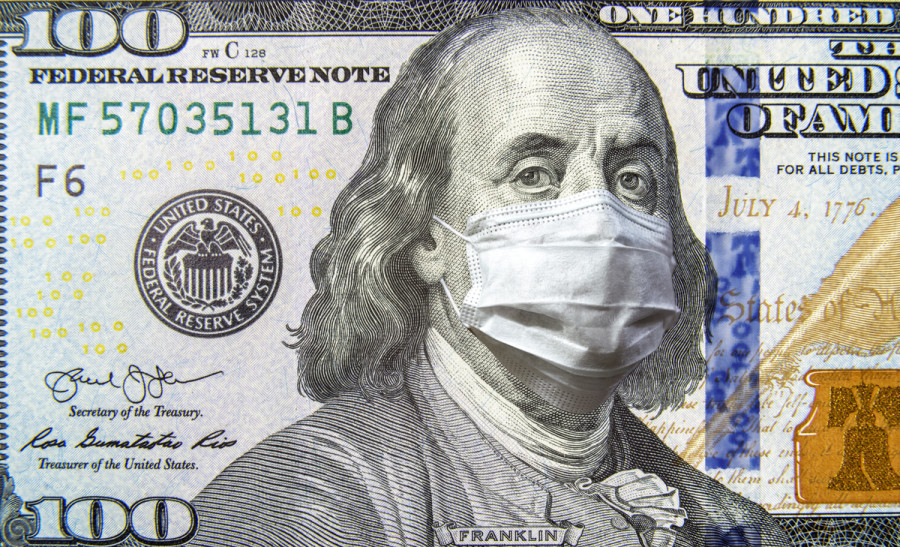Columns
Coronavirus crisis in America
The US response has been stymied by disagreement over the role of the government and the private sector.
Prakash Chandra Lohani
The coronavirus terror is real. Most countries in the world, including the developed countries, have not yet been able to formulate a clear strategy against it. Governments have been caught unprepared to combat this disease that ignores national borders and is merciless against the human race. In the United States, the number of infected people has been rising exponentially; the administration under President Donald Trump does not have a road map against it. In the beginning, Trump literally ignored the pandemic as a joke and disregarded the preparations against the disease. The idea that the US is somehow different—the notion of American exceptionalism—seems to have been the undeclared basis of his thinking, perhaps not even being aware of it.
'In China, yes, but not in the US' was the theme that he seemed to project. When some signs of the virus were noticed, the president took it lightly and assured the people, possibly convinced of the view that it would have no chance of spreading in a technologically advanced and powerful country like the US. And now the coronavirus is a reality in all 50 states, with a higher concentration in big cities like New York and Los Angeles. The number of infected people is rising sharply, and the US public health system that has generally not been pro-low income and poor is facing the prospect of being overwhelmed by what some experts label as the corona tsunami on the horizon.
Shortages and political perception
To read in the news that the US, which is the most powerful and one of the richest countries on earth, is short of ventilators and other simple medical supplies in hospitals to combat the coronavirus in cities like New York is almost unbelievable. Watching the mayor of New York pleading with a sense of great pain in his face for ventilators from the federal government with the warning that the present stock is just enough for the next few days must have been astonishing even for US citizens. And yet the reality is that there seems to be a disconnect between the perception Trump holds, against that of the state governors and mayors and scientists all across the US regarding the nature of the Covid-19 threat and policies needed to fight it.
Given the US capability of manufacturing airplanes and space rockets, it should be no problem to manufacture ventilators—even at short notice. For an outsider watching the American scene, the whole process seems to have stalled on ideological considerations. This may sound strange, but the underlying cause for the inability of the system to rise to the occasion is the difference in the perception of the role of the government and the private sector. For the Trump administration, the private sector should take the lead in manufacturing the medical equipment necessary to face the present crisis. But those who are facing the crisis at the ground level demand that the federal government take the leadership and dictate to the corporations and do whatever it takes to produce the necessary equipment, even if it means closing other product lines for the time being.
They point out that during World War II, the government went outside the hallowed free market system and made sure that the corporations manufactured warplanes instead of cars or refrigerators. Government intervention did get the job done. In 1940, the US had a total of 3,300 planes; and three years later, total aircraft production was slightly over 100,000. This was possible because the government was leading the programme, and the private sector was asked to do what the government thought was necessary. So why cannot the government assume the same role now since this crisis is affecting all the people and their livelihoods? Basically, the issue boils down to the role of government and its relationship with the corporate sector in a crisis.
The ideological divide
The ideological divide in the West had been building up since the Reagan-Thatcher era characterised by a new form of liberalism focusing on the theme that government activism in the economy is the problem and not the solution. After the economic stagflation of the 1970s, this slogan was attractive; and with Nobel Laureate Professor Milton Friedman as one of its intellectual gurus, it gained momentum. One of its achievements, perhaps unintended, has been the rise of what has been labelled as 'corporatocracy' which has not hesitated in using its financial power in politics and policymaking.
Over the years, it has led to increasing economic inequality with a rising share of the GDP being claimed by owners of capital. In the US, the share of income taken by the top 1 percent has doubled since the mid-1970s. This is more or less the same in other Anglo-Saxon countries during this period. This is also reflected in the pay of CEOs: It increased from 20 times that of the average worker to 231 times in the last three decades. Gradually the 'American dream' is becoming an increasingly difficult goal, and rising frustration among the many who see themselves falling behind has paved the way for a new wave of populism which forms the basis of Trump’s political base.
Rising economic inequality, a sense of falling behind among the lower-income groups, and the political clout of the new corporatocracy has polarised American politics as never before. Trump seems to represent one pole, and he does not hesitate to flout it as the identity of his administration. This is reflected even at a time of national crisis. It seems that one section of the US political elite wants the government to take the lead and do whatever it takes to get the required medical supplies from the manufacturing sector, as was done during the Second World War while procuring airplanes; but another section that Trump feels close to sees this as 'nationalisation', and therefore, against the spirit of free enterprise.
Naturally, the federal administration remains without a sense of direction, and state and local governments cannot understand why important decisions are not taken even when the whole nation is being threatened. Whatever the results, it seems that the US political system is likely to undergo a transformation that few can predict at the moment.




 10.12°C Kathmandu
10.12°C Kathmandu















